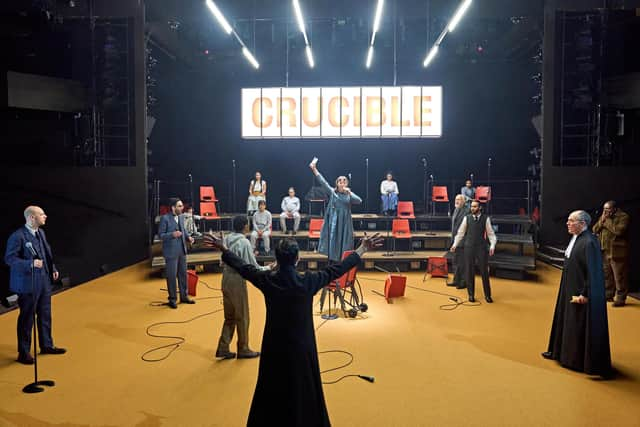Five star review of The Crucible at the Crucible Theatre, Sheffield
At the time that Arthur Miller was tapping away at the keyboard of his typewriter, and jotting down ideas on his notepad, one of the most vicious events in recent American history was unfolding.
Senator Joe McCarthy was feeding on lies, deception, and the fear of the “red peril” to accuse noted citizens of being in the pay of, or at least be sympathetic to, Communism.
Advertisement
Hide AdAdvertisement
Hide AdMiller felt that the way to challenge the odious politician was to write The Crucible as a sort of parable of his time. The similarities were obvious. But many believed (and still do) that this was the playwright’s big cop-out. Instead of going for McCarthy and his supporters head-to-head, he offered a play that is not overtly political, but instead deals with the refusal of a stubborn and principled man to enter into enforced allegiance.


This is an examination not of the braying McCarthy and his bullying tactics, but of a man, John Proctor, who stands up to them – in a completely different time and setting. The action stays very close to that period, and to fact. Here, a group of saucy wantons are charged with some risky rites in the woods close to Salem. They hope to wriggle out of their plight by turning the tables, and by accusing their neighbours and fellow townsfolk of having summoned the devil and sent him into them. They have been cavorting in the copse, gallivanting in the greenery, but it wasn’t their fault. Incredibly, their explanation is believed, a tribunal is set up, and the hangings begin. But there’s a lot of smoke, and probably no fire.
Inevitably, John Proctor (whose wife has been named as a witch) sacrifices himself for his principles after being accused by the malicious leader of the crypto-coven, Abigail Williams. Ugliness and treachery are evident in every line, if you are silent, then you are guilty, and whoever speaks for a prisoner’s innocence is immediately suspected of complicity. It happened in Salem, Hitler and Stalin honed it to a fine art, McCarthy was a disciple, and Putin is following their example. Director Anthony Lau delivers an intriguing production. It’s not quite costume of the period, and it’s certainly not contemporaneous with McCarthy, and yet there’s a constant use of microphones, not just to set the scene, but as part of enhancing the acting performance.
Georgia Lowe’s set is pared back, reflecting the austerity of the original Massachusetts settlers, and it takes the audience to the heart of the action, as does the lighting of Jess Bernberg, and the subtle, almost inaudible but sinister music of Giles Thomas.
Advertisement
Hide AdAdvertisement
Hide AdIt’s a fine ensemble cast, but just a few performances gleam – the sound common sense of Rebecca Nurse (Alexandra Mathie) , the malicious hysteria of Abigail Williams, made very real and tangibly vindictive by Rose Shalloo, and Simon Manyonda’s honest, open and hugely likeable John Proctor, a man backed into a corner, full of contempt for the society around him, and forced into actions which will inflict him deeply.
False information, spite, complete disregard for the truth, crude manipulation – is anyone else reminded that a general election is on the way?
To March 30.